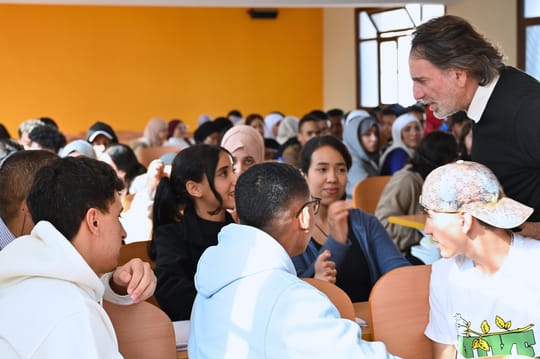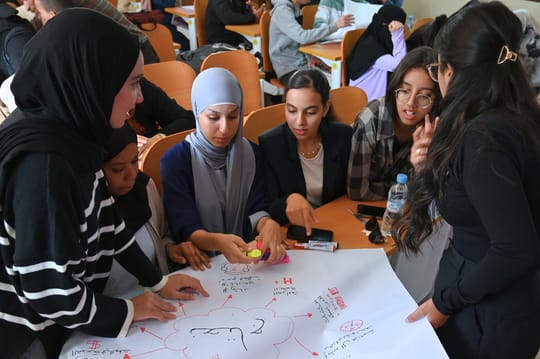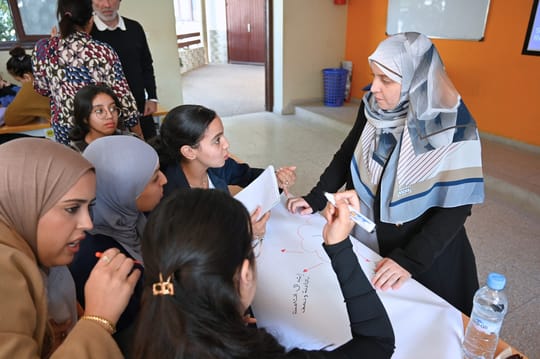Participatory Community Mapping: An Inspiring Experience in Unifying Priorities

The Faculty of Letters and Human Sciences, Ibn Zohr University, Agadir hosted a transformative workshop on “The Participatory Approach and Community Mapping” on the 10th of December 2024. The workshop, presented by Dr. Yossef Ben-Meir, was conducted as part of the partnership established between the High Atlas Foundation and the Faculty to introduce students to community empowerment methods and sustainable development practices.
The workshop was attended by 180 students, hailing from diverse regions. The students demonstrated exceptional enthusiasm and readiness to learn participatory planning techniques and engage with community members. Working in groups of six to eight, the students were tasked with diagnosing the needs of their micro-community, represented by the faculty itself. Each group was provided with paper and pens to document and visually map the needs they deemed most critical for the faculty. A designated spokesperson was nominated to present and defend the groups findings before their peers, creating a highly interactive and participatory atmosphere.
The students' identified needs were varied, reflecting the richness of their cultural and social backgrounds. Through intense discussions during the workshop, the students arrived at a list of ten primary priorities, including:
Establishing an educational and recreational space for activities and performances.
Launching student-led volunteer programs.
Equipping the library with modern resources and books.
Building a theater and cinema.
Providing student transportation services.
Setting up a medical clinic on campus.
Bringing services closer to students in vulnerable situations.
Offering psychological support services.
Creating a sports facility.
Establishing support for students in challenging circumstances.
What distinguished these demands was the broad consensus achieved among the different student groups. During the discussions, some students discovered that certain needs were already available, while others were deliberated upon and advocated for inclusion in the faculty's future plans. This process was guided by the participatory methods they learned during the workshop.

Dr. Ben-Meir. applied a methodology to create a priority matrix, comparing each need against the others to identify the most pressing ones. After an hour of discussions and voting, the students reached a consensus that prioritizing services and care for individuals in vulnerable situations should be the top priority. This was followed by the establishment of a cultural, educational, and recreational space, which was recognized for its role in nurturing students’ talents and fostering creativity.
The workshop served as an opportunity to diagnose needs, and also as a platform for developing students’ dialogue and advocacy skills. They learned how the participatory approach can unify objectives and voices within a community, fostering a shared sense of responsibility and teamwork. Students gained insight into the initial steps of community diagnosis, the importance of engaging all stakeholders in the participatory approach, and the necessity of prioritizing needs to unify efforts and work towards sustainable solutions. This understanding helped them realize how collective community action can achieve shared goals that address the needs of its members.
Through this workshop, students recognized that their faculty is not merely a place for academic learning, but rather a community that requires its members to work collectively toward improvement. By applying these concepts, the students despite the workshop being a new experience for them showed significant engagement and demonstrated a deep understanding of participatory approaches and community planning.
Ultimately, the students concluded that the key to sustainable development in any region begins with genuine participation from key stakeholders - community members, business owners, and decision-makers. By collaborating with these stakeholders to understand their needs and circumstances, comprehensive agreement on developmental projects can be achieved, ensuring their sustainability and success.

The workshop was an inspiring and dynamic experience, filled with enthusiasm and excitement. Students expressed their joy at learning new skills such as critical thinking and teamwork. These skills will significantly enhance their future aspirations while providing them with effective tools to contribute to improving their university and local communities.
The workshop concluded with widespread approval and satisfaction from the students, who eagerly look forward to future workshops. They also praised the substantial efforts of the Dean of the Faculty of Arts and Humanities, Dr. Mohamed Naji, and Dr. Afaf Hamzaoui, for their support and dedication to implementing a fruitful partnership with the High Atlas Foundation for the benefit of students, aiming to enhance learning opportunities and personal development within the faculty.